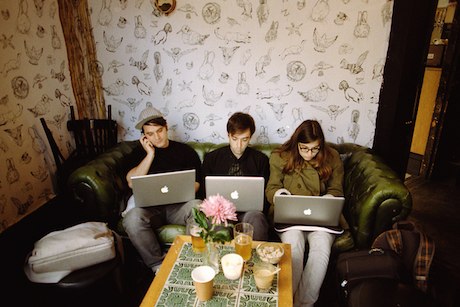The one where Facebook is our friend
Laptop on my knee at the local bar, I intended to write a post about the potentially positive impact social media has on addiction. Perhaps I'd cover how forums, niche networks and even public posts might assist in the recovery and support of those alienated from society.
It’s a topic that fascinates me because it may well be an area in which the online social engine has made a positive impact on life expectancy (or at least longevity). However, on posting my intentions to Facebook, friends immediately steered me to the subject of social media itself as an addictive pastime.
Then they quickly started to debate the impact social media has had on friendship and the art of having a friend. This happens a lot. It’s the way with Facebook - agendas evolve to the base need: the need to be wanted. Or cats.
Talk about Facebook in the real world (by that, I mean here at the pub) and it’s common for people to admit to frequent use of the platform whilst condemning it for the perceived impact it has on their lives.
It’s “not real”, it’s “intrusive”, it’s “replacing real social interaction”. I hear this all the time. From people I arranged to meet through Facebook. People I am quite certain I would not have connected or reconnected with unless they flashed up on Hootsuite.
Does this mean there is an inherent fault in our friendship if it originated on or was refuelled by social media? Would the relationship have been ‘better’ if we happened to find ourselves at street level and made an active choice to appear in each other’s window more often? Personally I doubt it.
It’s true that social media has changed things. We are genetically built to exist in a village and having outgrown those (through layers of tech-anthropology) we yearn for the sort of reassurance of identity, mutual-defence and seed-sowing that village life brings.
Social media replaces it, in some part, with the Like and the friends list. However, I don’t think Facebook broke the original village. I don’t think Twitter created the city or the lonely homeworker. I think we adapted the technologies we had to fill the void. We’ve always needed what the social engine spits out and we’ve always had it, just on a smaller, slower scale.
Think back to your High School yearbook. The first, slowest Facebook. There you are with your profile, your signatures, and your defined friends. Opening mine today, I’m amused to see I was voted most likely to “start a cult”.
We were always summarised by our peers and presented to the world in this way. We even did it to ourselves, tagging the walls with our mark, wearing our team’s shirt, starting a band. This time I guess, the key difference is that we’re always the boss, the head of our club, rather than the participant or voted trustee. It’s much quicker this way, but still only meaningful when displayed to friends.
I don’t think social media has changed the way we treat friendship. I still get angry with the friend who doesn’t respond to me reaching out, I just do so within a shorter timeframe. I still find my friend’s friends intriguing but I don’t meet them through the intermingling of spilled pints, I notice their comments and connections online. To borrow a phrase from elsewhere, the “pollination of friendship” happens in a different way, but it still happens. It probably happens more often than it ever did, admittedly with a more heavily edited ‘first impression’.
"It’s popular to hate Facebook. I hate it only because I once designed a better one. But we don’t really hate it, we just don’t like to see the mirror of ourselves so clearly."
In a world where we all explain everything, it can be painful to witness the lack of depth, sincerity and empathy we honestly have within us as a species.
Yet it’s always been this way. If you wanted to reach out to me and make a date for a shared experience, on solid pastures, under real weather, you would. But we don’t. We were never fated to. We’re simply not that way inclined.
Yet Facebook, Twitter, Snapchat, Whatsapp, all of these things will combine. There is absolutely no doubt in my mind that technology is simply adapted to need, not by design. The keenest need mankind has now is constant, open communication.
Whilst we have headlines that shock and disgust us and/or pilgrimages that inspire but confuse us, we have to keep talking and we do so as villagers, dispossesed. I think we simply weren’t so confused before. Or in a position to be confused. Or allowed to express our confusion so globally and without meaningful investment in the medium.
We could reach out and use it differently. We could rewrite the code to enforce sincerity and physicality. Indeed we probably will, when the share price drops. With wearability will come hugs and touching and all that sticky stuff.
I think though, that the way we use social media today is more a symptom of a generation that hasn’t yet understood the power we have. We don’t yet realise as a society, the impact of our rapidly published status and the effect one tweet has on the emotions of countless others.
As we learn the impact (as we did with printed word, broadcast media, cults and such things), we will self-restrict or purposely pre-think and we will evolve our interaction with these technologies to suit. There may be no relaunch.
Even though I wanted to blog about addiction and not the afflicted, this all leads me back to the pub. It’s not the digital tools which enable or disable those friend-enhancing pints we consume. It’s the hands that cross the tools. And ours are still itching with possibility, rather than meditative pause.
It’s your choice to define the use of social media during physical meetings as acceptable or rude. It’s up to us to decide what a Like means or how committed we really are when we press “attend”. And there will be casualties along the way, as there have always been when powerful things became available to all.
Maybe before this time, before we were open to so many opinions published so attractively, it was easier to find direction and purpose in life. Maybe we didn’t see the size of things and therefore the giganticness of being alone, even if we logistically always were.
Perhaps we felt we could achieve more or be more, before we saw everyone else so publically stumble. It's not so much that we've lost friendship through Facebook but more our sense of fate? The very thing which gave it oodles of value.



